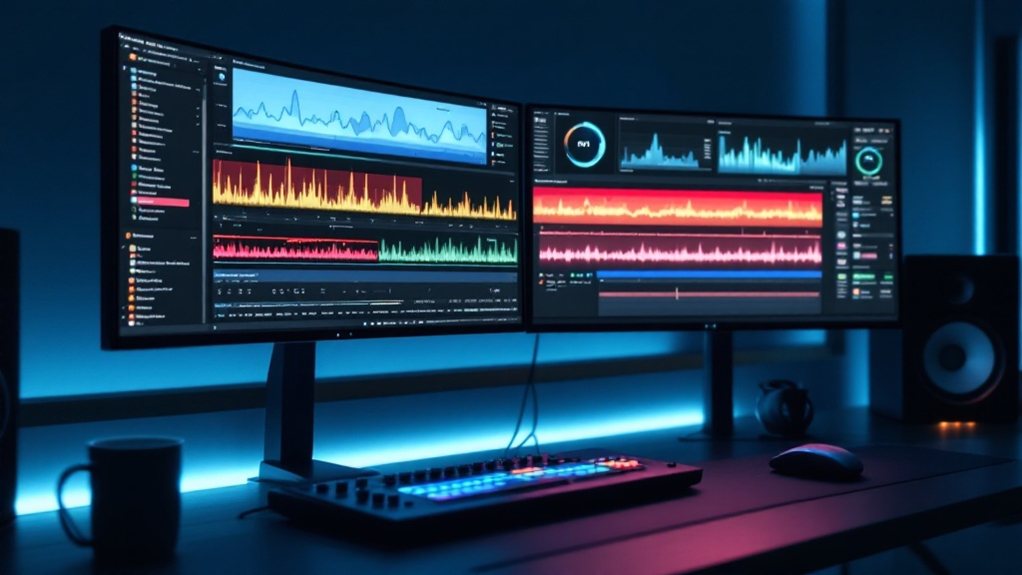AI is transforming mental health care in remarkable ways. Studies show AI chatbots can reduce depression symptoms by 51%, while virtual reality enables exposure therapy without real-world triggers. These digital tools provide 24/7 support, breaking down barriers of cost and accessibility. Privacy concerns exist, but AI’s ability to analyze patterns and provide personalized treatment is revolutionizing the field. Traditional therapy isn’t going away, but AI mental health support offers intriguing possibilities worth exploring further.

Imagine a therapist who never sleeps, never judges, and lives inside your smartphone. That’s not science fiction – it’s artificial intelligence revolutionizing mental health care right now. AI-powered chatbots and digital tools are already helping millions cope with anxiety, depression, and other mental health challenges. And they’re getting smarter every day.
The numbers don’t lie. AI systems can predict and classify anxiety and depression with remarkable accuracy. Recent studies show patients experiencing 51% reduction in depression symptoms when using AI therapy chatbots. They analyze everything from speech patterns to brain imaging data, catching warning signs that humans might miss. Machine learning algorithms plow through massive datasets, identifying patterns that could signal emerging mental health issues. Early detection matters. A lot. With 350 million people suffering from depression worldwide, the need for innovative solutions has never been greater.
Virtual reality and AI are teaming up to deliver immersive therapy experiences. Think exposure therapy for phobias, minus the actual spiders. FDA-approved digital therapeutics track patient engagement and progress. Mobile apps monitor mood swings and offer real-time support. It’s like having a mental health coach in your pocket – minus the awkward small talk.
But here’s where it gets really interesting: AI is democratizing mental health care. Geography doesn’t matter anymore. Remote villages? No problem. Can’t afford traditional therapy? AI-powered solutions are often more accessible and affordable. These tools are breaking down barriers and smashing stigmas, one algorithm at a time. Similar to broader healthcare trends, predictive analytics are helping mental health providers anticipate patient needs and develop proactive treatment strategies.
Of course, it’s not all sunshine and perfectly coded algorithms. Privacy concerns are real. Data security matters when you’re dealing with someone’s most intimate thoughts. And let’s be honest – AI isn’t perfect. Bias in algorithms is a serious issue that needs constant attention.
Plus, there’s no replacing human therapists entirely. AI works best as a complement to traditional care, not a replacement.
The bottom line? AI is transforming mental health care in ways that were unimaginable just a few years ago. It’s making treatment more accessible, personalized, and effective. Sure, there are challenges to overcome. But the potential to improve millions of lives? That’s worth the effort.
Frequently Asked Questions
How Much Does Ai-Based Mental Health Therapy Typically Cost?
The cost of AI-based mental health therapy varies dramatically.
Building an app like Wysa? That’ll set developers back $95,000 to $200,000.
But patients catch a break – AI therapy is way cheaper than traditional counseling. Simple AI mental health tools start around $10,000 to develop. Testing alone costs $10,000-$25,000.
Bottom line: AI makes mental health support more affordable and accessible, despite hefty development costs.
Can AI Detect Suicidal Thoughts Through Social Media Posts?
Yes, AI can detect suicidal thoughts in social media posts with impressive accuracy.
Current systems use machine learning and natural language processing to analyze linguistic patterns, emotional markers, and behavioral changes. Studies show detection rates up to 93% precision.
It’s not perfect – but it’s surprisingly good at spotting red flags days before humans notice. The technology scans posts across platforms like Reddit and Twitter, tracking concerning shifts in user behavior.
Are AI Therapy Sessions Covered by Health Insurance Plans?
Currently, most health insurance plans don’t cover AI therapy sessions.
It’s a new frontier – and insurers are still figuring it out. While some companies are exploring AI options for cost savings, traditional human therapy remains the standard for coverage.
Insurance giants are interested, sure, but they’re moving cautiously. Regulations are still evolving, and lawmakers are just starting to address AI in mental health care.
What Happens if AI Misdiagnoses a Serious Mental Health Condition?
AI misdiagnosis of serious mental health conditions can be devastating.
Wrong diagnoses lead to inappropriate treatments, delayed proper care, and worsening symptoms. Patients might receive harmful medications or miss essential interventions.
The consequences? Depression might be mistaken for bipolar disorder, anxiety for psychosis. Real people suffer while algorithms mess up.
And here’s the kicker – there’s often no clear accountability when AI gets it wrong.
How Secure Is Personal Information Shared During AI Mental Health Sessions?
Personal information in AI mental health sessions is protected by multiple security layers. Companies use encryption, strict access controls, and HIPAA-compliant systems.
But let’s be real – no system is completely hack-proof. Data breaches happen. The good news? Most platforms de-identify data and minimize collection to reduce risks.
Think bank vault, not cookie jar. Still, users should know what they’re sharing and with whom.









